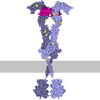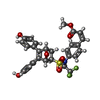[English] 日本語
 Yorodumi
Yorodumi- PDB-7rs1: Crystal Structure of the ER-alpha Ligand-binding Domain (L372S, L... -
+ Open data
Open data
- Basic information
Basic information
| Entry | Database: PDB / ID: 7rs1 | ||||||
|---|---|---|---|---|---|---|---|
| Title | Crystal Structure of the ER-alpha Ligand-binding Domain (L372S, L536S) in complex with DMERI-21 | ||||||
 Components Components | Estrogen receptor | ||||||
 Keywords Keywords | TRANSCRIPTION/TRANSCRIPTION INHIBITOR / ER-alpha / ligand complex / DMERI / TRANSCRIPTION-TRANSCRIPTION INHIBITOR complex | ||||||
| Function / homology |  Function and homology information Function and homology informationregulation of epithelial cell apoptotic process / antral ovarian follicle growth / regulation of branching involved in prostate gland morphogenesis / RUNX1 regulates transcription of genes involved in WNT signaling / RUNX1 regulates estrogen receptor mediated transcription / regulation of toll-like receptor signaling pathway / nuclear estrogen receptor activity / epithelial cell development / steroid hormone receptor signaling pathway / prostate epithelial cord elongation ...regulation of epithelial cell apoptotic process / antral ovarian follicle growth / regulation of branching involved in prostate gland morphogenesis / RUNX1 regulates transcription of genes involved in WNT signaling / RUNX1 regulates estrogen receptor mediated transcription / regulation of toll-like receptor signaling pathway / nuclear estrogen receptor activity / epithelial cell development / steroid hormone receptor signaling pathway / prostate epithelial cord elongation / epithelial cell proliferation involved in mammary gland duct elongation / prostate epithelial cord arborization involved in prostate glandular acinus morphogenesis / mammary gland branching involved in pregnancy / uterus development / negative regulation of smooth muscle cell apoptotic process / vagina development / TFIIB-class transcription factor binding / androgen metabolic process / mammary gland alveolus development / cellular response to estrogen stimulus / estrogen response element binding / Mitochondrial unfolded protein response (UPRmt) / nuclear receptor-mediated steroid hormone signaling pathway / Nuclear signaling by ERBB4 / : / : / RNA polymerase II preinitiation complex assembly / positive regulation of nitric-oxide synthase activity / estrogen receptor signaling pathway / protein localization to chromatin / steroid binding / 14-3-3 protein binding / TFAP2 (AP-2) family regulates transcription of growth factors and their receptors / negative regulation of canonical NF-kappaB signal transduction / ESR-mediated signaling / negative regulation of miRNA transcription / TBP-class protein binding / nitric-oxide synthase regulator activity / nuclear estrogen receptor binding / transcription corepressor binding / transcription coregulator binding / stem cell differentiation / SUMOylation of intracellular receptors / cellular response to estradiol stimulus / euchromatin / beta-catenin binding / Nuclear Receptor transcription pathway / response to estrogen / transcription coactivator binding / male gonad development / nuclear receptor activity / positive regulation of fibroblast proliferation / Constitutive Signaling by Aberrant PI3K in Cancer / sequence-specific double-stranded DNA binding / positive regulation of nitric oxide biosynthetic process / Regulation of RUNX2 expression and activity / Ovarian tumor domain proteases / response to estradiol / PIP3 activates AKT signaling / positive regulation of cytosolic calcium ion concentration / ATPase binding / PI5P, PP2A and IER3 Regulate PI3K/AKT Signaling / regulation of inflammatory response / DNA-binding transcription activator activity, RNA polymerase II-specific / fibroblast proliferation / transcription regulator complex / phospholipase C-activating G protein-coupled receptor signaling pathway / Estrogen-dependent gene expression / DNA-binding transcription factor activity, RNA polymerase II-specific / calmodulin binding / Extra-nuclear estrogen signaling / RNA polymerase II cis-regulatory region sequence-specific DNA binding / chromatin remodeling / DNA-binding transcription factor activity / negative regulation of gene expression / chromatin binding / regulation of DNA-templated transcription / regulation of transcription by RNA polymerase II / protein kinase binding / chromatin / positive regulation of DNA-templated transcription / enzyme binding / negative regulation of transcription by RNA polymerase II / Golgi apparatus / signal transduction / positive regulation of transcription by RNA polymerase II / protein-containing complex / zinc ion binding / nucleoplasm / identical protein binding / nucleus / membrane / plasma membrane / cytosol / cytoplasm Similarity search - Function | ||||||
| Biological species |  Homo sapiens (human) Homo sapiens (human) | ||||||
| Method |  X-RAY DIFFRACTION / X-RAY DIFFRACTION /  SYNCHROTRON / SYNCHROTRON /  MOLECULAR REPLACEMENT / MOLECULAR REPLACEMENT /  molecular replacement / Resolution: 1.59 Å molecular replacement / Resolution: 1.59 Å | ||||||
 Authors Authors | Min, J. / Nwachukwu, J.C. / Min, C.K. / Njeri, J.W. / Srinivasan, S. / Rangarajan, E.S. / Nettles, C.C. / Yan, S. / Houtman, R. / Griffin, P.R. ...Min, J. / Nwachukwu, J.C. / Min, C.K. / Njeri, J.W. / Srinivasan, S. / Rangarajan, E.S. / Nettles, C.C. / Yan, S. / Houtman, R. / Griffin, P.R. / Izard, T. / Katzenellenbogen, B.S. / Katzenellenbogen, J.A. / Nettles, K.W. | ||||||
| Funding support |  United States, 1items United States, 1items
| ||||||
 Citation Citation |  Journal: Proc.Natl.Acad.Sci.USA / Year: 2021 Journal: Proc.Natl.Acad.Sci.USA / Year: 2021Title: Dual-mechanism estrogen receptor inhibitors. Authors: Min, J. / Nwachukwu, J.C. / Min, C.K. / Njeri, J.W. / Srinivasan, S. / Rangarajan, E.S. / Nettles, C.C. / Sanabria Guillen, V. / Ziegler, Y. / Yan, S. / Carlson, K.E. / Hou, Y. / Kim, S.H. / ...Authors: Min, J. / Nwachukwu, J.C. / Min, C.K. / Njeri, J.W. / Srinivasan, S. / Rangarajan, E.S. / Nettles, C.C. / Sanabria Guillen, V. / Ziegler, Y. / Yan, S. / Carlson, K.E. / Hou, Y. / Kim, S.H. / Novick, S. / Pascal, B.D. / Houtman, R. / Griffin, P.R. / Izard, T. / Katzenellenbogen, B.S. / Katzenellenbogen, J.A. / Nettles, K.W. | ||||||
| History |
|
- Structure visualization
Structure visualization
| Structure viewer | Molecule:  Molmil Molmil Jmol/JSmol Jmol/JSmol |
|---|
- Downloads & links
Downloads & links
- Download
Download
| PDBx/mmCIF format |  7rs1.cif.gz 7rs1.cif.gz | 387.4 KB | Display |  PDBx/mmCIF format PDBx/mmCIF format |
|---|---|---|---|---|
| PDB format |  pdb7rs1.ent.gz pdb7rs1.ent.gz | 316.7 KB | Display |  PDB format PDB format |
| PDBx/mmJSON format |  7rs1.json.gz 7rs1.json.gz | Tree view |  PDBx/mmJSON format PDBx/mmJSON format | |
| Others |  Other downloads Other downloads |
-Validation report
| Arichive directory |  https://data.pdbj.org/pub/pdb/validation_reports/rs/7rs1 https://data.pdbj.org/pub/pdb/validation_reports/rs/7rs1 ftp://data.pdbj.org/pub/pdb/validation_reports/rs/7rs1 ftp://data.pdbj.org/pub/pdb/validation_reports/rs/7rs1 | HTTPS FTP |
|---|
-Related structure data
| Related structure data | 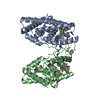 7rrxC  7rryC  7rrzC  7rs0C 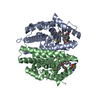 7rs2C  7rs3C  7rs4C  7rs7C  7rs8C 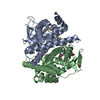 7rs9C  2qxsS S: Starting model for refinement C: citing same article ( |
|---|---|
| Similar structure data |
- Links
Links
- Assembly
Assembly
| Deposited unit | 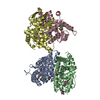
| ||||||||
|---|---|---|---|---|---|---|---|---|---|
| 1 | 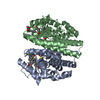
| ||||||||
| 2 | 
| ||||||||
| Unit cell |
|
- Components
Components
| #1: Protein | Mass: 29380.520 Da / Num. of mol.: 4 / Fragment: Ligand binding domain / Mutation: L372S, L536S Source method: isolated from a genetically manipulated source Source: (gene. exp.)  Homo sapiens (human) / Gene: ESR1, ESR, NR3A1 / Production host: Homo sapiens (human) / Gene: ESR1, ESR, NR3A1 / Production host:  #2: Chemical | ChemComp-7Q5 / #3: Water | ChemComp-HOH / | Has ligand of interest | Y | |
|---|
-Experimental details
-Experiment
| Experiment | Method:  X-RAY DIFFRACTION / Number of used crystals: 1 X-RAY DIFFRACTION / Number of used crystals: 1 |
|---|
- Sample preparation
Sample preparation
| Crystal | Density Matthews: 2.14 Å3/Da / Density % sol: 42.56 % |
|---|---|
| Crystal grow | Temperature: 298 K / Method: evaporation Details: 20-25% PEG 3350, 200 mM MgCl2, 0.1 M Bis-Tris/Hepes/Tris-HCl PH range: 6.5 - 8.0 |
-Data collection
| Diffraction | Mean temperature: 100 K / Serial crystal experiment: N |
|---|---|
| Diffraction source | Source:  SYNCHROTRON / Site: SYNCHROTRON / Site:  APS APS  / Beamline: 22-ID / Wavelength: 1 Å / Beamline: 22-ID / Wavelength: 1 Å |
| Detector | Type: RAYONIX MX300-HS / Detector: CCD / Date: Mar 22, 2017 |
| Radiation | Protocol: SINGLE WAVELENGTH / Monochromatic (M) / Laue (L): M / Scattering type: x-ray |
| Radiation wavelength | Wavelength: 1 Å / Relative weight: 1 |
| Reflection | Resolution: 1.59→89.9 Å / Num. obs: 93507 / % possible obs: 91.4 % / Redundancy: 7.9 % / CC1/2: 0.999 / Net I/σ(I): 17.1 |
| Reflection shell | Resolution: 1.59→1.73 Å / Num. unique obs: 4676 / CC1/2: 0.486 |
-Phasing
| Phasing | Method:  molecular replacement molecular replacement |
|---|
- Processing
Processing
| Software |
| |||||||||||||||||||||||||||||||||||||||||||||||||||||||||||||||||||||||||||||||||||||||||||||||||||||||||||||||||||||||||||||||||||||||||||||||||
|---|---|---|---|---|---|---|---|---|---|---|---|---|---|---|---|---|---|---|---|---|---|---|---|---|---|---|---|---|---|---|---|---|---|---|---|---|---|---|---|---|---|---|---|---|---|---|---|---|---|---|---|---|---|---|---|---|---|---|---|---|---|---|---|---|---|---|---|---|---|---|---|---|---|---|---|---|---|---|---|---|---|---|---|---|---|---|---|---|---|---|---|---|---|---|---|---|---|---|---|---|---|---|---|---|---|---|---|---|---|---|---|---|---|---|---|---|---|---|---|---|---|---|---|---|---|---|---|---|---|---|---|---|---|---|---|---|---|---|---|---|---|---|---|---|---|---|
| Refinement | Method to determine structure:  MOLECULAR REPLACEMENT MOLECULAR REPLACEMENTStarting model: pdbid 2QXS Resolution: 1.59→89.8 Å / Cor.coef. Fo:Fc: 0.958 / Cor.coef. Fo:Fc free: 0.936 / SU B: 5.802 / SU ML: 0.092 / Cross valid method: THROUGHOUT / ESU R: 0.125 / ESU R Free: 0.118 / Stereochemistry target values: MAXIMUM LIKELIHOOD Details: U VALUES : WITH TLS ADDED HYDROGENS HAVE BEEN ADDED IN THE RIDING POSITIONS U VALUES : RESIDUAL ONLY
| |||||||||||||||||||||||||||||||||||||||||||||||||||||||||||||||||||||||||||||||||||||||||||||||||||||||||||||||||||||||||||||||||||||||||||||||||
| Solvent computation | Ion probe radii: 0.7 Å / Shrinkage radii: 0.7 Å / VDW probe radii: 1 Å / Solvent model: MASK | |||||||||||||||||||||||||||||||||||||||||||||||||||||||||||||||||||||||||||||||||||||||||||||||||||||||||||||||||||||||||||||||||||||||||||||||||
| Displacement parameters | Biso max: 128.08 Å2 / Biso mean: 34.887 Å2 / Biso min: 12.04 Å2
| |||||||||||||||||||||||||||||||||||||||||||||||||||||||||||||||||||||||||||||||||||||||||||||||||||||||||||||||||||||||||||||||||||||||||||||||||
| Refinement step | Cycle: final / Resolution: 1.59→89.8 Å
| |||||||||||||||||||||||||||||||||||||||||||||||||||||||||||||||||||||||||||||||||||||||||||||||||||||||||||||||||||||||||||||||||||||||||||||||||
| Refine LS restraints |
| |||||||||||||||||||||||||||||||||||||||||||||||||||||||||||||||||||||||||||||||||||||||||||||||||||||||||||||||||||||||||||||||||||||||||||||||||
| LS refinement shell | Resolution: 1.59→1.629 Å / Rfactor Rfree error: 0
| |||||||||||||||||||||||||||||||||||||||||||||||||||||||||||||||||||||||||||||||||||||||||||||||||||||||||||||||||||||||||||||||||||||||||||||||||
| Refinement TLS params. | Method: refined / Refine-ID: X-RAY DIFFRACTION
| |||||||||||||||||||||||||||||||||||||||||||||||||||||||||||||||||||||||||||||||||||||||||||||||||||||||||||||||||||||||||||||||||||||||||||||||||
| Refinement TLS group |
|
 Movie
Movie Controller
Controller


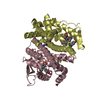
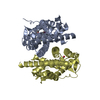
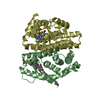
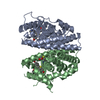
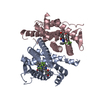
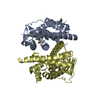
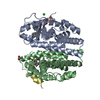
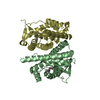
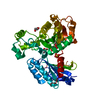
 PDBj
PDBj

